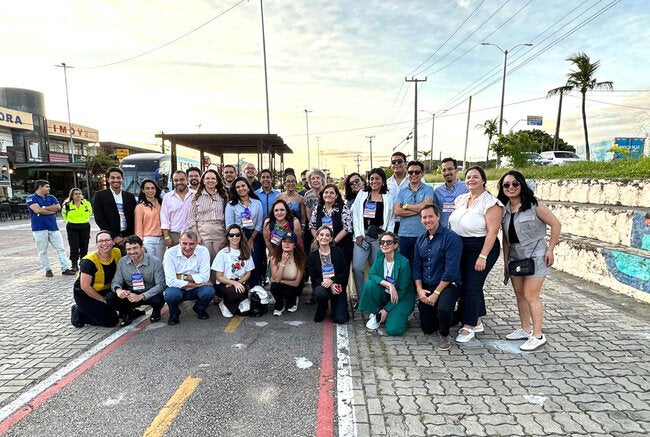
July 28, 2025 (PAHO/WHO) – The journalists from Argentina, Brazil, Colombia, Ecuador and Mexico participated in a regional workshop on solutions journalism and road safety held in Natal, Brazil. The event was organized by the Pan American Health Organization/World Health Organization (PAHO/WHO), with the support of the Bloomberg philanthropies initiative for global safety. The workshop offered tools to transform the way in which traffic incidents are covered by the media, framing them not only as tragedies but also as problems with real evidence -based solutions.
In the Americas, traffic accidents demand more than 145,000 lives each year and cause at least 4.1 million non -fatal injuries, including more than 638,000 serious injuries. Countries around the world have pledged to half the deaths and traffic injuries by 2030. In the region, this means reducing the current road mortality rate from 14.09 to 6.73 per 100,000 inhabitants.
«Traffic deaths are just the tip of the iceberg,» said Ricardo Pérez Núñez, Pah Regional Advisor on Road Safety. «For each death, there are 28 injured people, of which four may suffer permanent consequences,» he added, emphasizing the need to move towards «transport systems that are safe, sustainable, inclusive and equitable.»
PAHO/Who sees the training of journalists as a key pillar to accelerate change.
Journalism as a engine of change
The workshop, which was held from July 22 to 23, addressed the key road safety challenges and promoted a systems -based approach, transferring the responsibility of people and those who design policies, infrastructure and regulations. Among the solutions discussed were the compact urban design, safe public transport and active mobility.
«Traffic injuries are not inevitable. They are preventable and predictable,» said Victor Pavarino, Paho/WHO, the focal point of road safety in Brazil, pointing out the disproportionate load on pedestrians, cyclists and motorcyclists, especially in vulnerable communities.
Matthew Taylor, a communications consultant with whom he highlighted the importance of language in the coverage of the media: «Use terms such as ‘shock’ or ‘collision’ instead of ‘accident’ highlights that these events are avoidable.» He also emphasized the need to provide a systemic context, linking blockages with broader failures, such as lack of infrastructure or application. «News reports must catch up with science. The way we tell these stories can generate public support for structural changes that save lives,» he said.
Taylor also introduced the principles of solution journalism, a practice that emphasizes rigorous and evidence -based reports on how societies are responding to the challenges, instead of focusing solely on what went wrong. «It’s not about hiding problems,» he said. «It’s about showing what answers are being implemented, how they work, what results are achieving and what lessons can be drawn.»
The workshop included a visit to the site to observe interventions implemented by the city of Native, such as its new binary traffic system, designed to reduce risks and improve circulation. Participants also listened to journalists and relatives of accident victims who work to turn personal loss into action.
A growing regional network
This training is part of a broader global strategy led by WHO and its partners to strengthen road safety coverage. More than 3,000 journalists have been trained worldwide. In Latin America, cities such as Medellín, Buenos Aires, Bogotá and now native, have organized these workshops since 2017.
Through practical exercises, participants learned to apply journalism of solutions in their daily reports. «It’s not just about informing what happened,» said Sebastián Oliel, a media and communications specialist from Pah. «It is about investigating how it could have been avoided. About moving without processing to a deeper analysis. From focusing on individual error to exposing system failures that can be addressed to protect users and reduce the risk of serious injuries and deaths.»
«The tools that I am recovering to Colombia go far beyond road safety: they have changed how I think about covering this problem,» said Nicoll Buitrago, a news journalist Caracol from Colombia.
Daiana Lombardo, from Channel all news from Argentina, added: «With the correct policies, timely decisions, road safety education, and yes, fines and compliance, thousands of lives could have been saved. For me personally, this workshop caused a need to boost the change of my small corner of the world, to understand that I have the opportunity to improve the quality of people’s lives, at least the change.»






